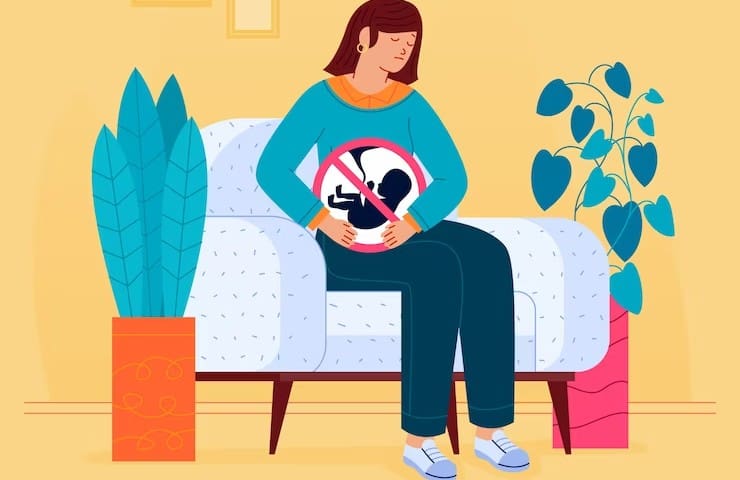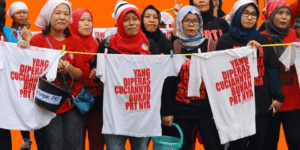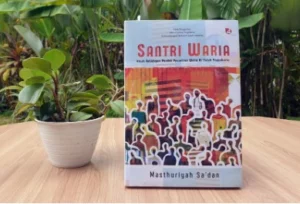Unwanted pregnancies resulting from rape or incest are types of pregnancies permitted by Law to be aborted. Abortion arrangements for rape victims are pretty comprehensive, starting from the Health Law, Government Regulations on Reproductive Health, and Minister of Health Regulations on Training and Providing Abortion Services.
SPEKHAM, a service provider organization for victims of violence based in Surakarta City (Solo), noted that throughout 2021 it received 78 complaints, 12 of which were cases of sexual violence, with 3 victims experiencing pregnancy.
Meanwhile, the Central Java Province PPT from January to August 2022 received 13 rape complaints, 10 of which occurred in children with 1 child experiencing pregnancy and 3 cases in adults with 2 pregnancies. P2TP2A/PTPAS Surakarta City received 3 rape complaints in the same period, and all victims experienced pregnancy.
In Jakarta, LBH APIK Jakarta, a legal aid organization based in Jabodetabek, noted that throughout 2021 it received 1,321 complaints. Of these, 48 cases involved sexual violence against children, and 66 cases involved sexual violence against adults, including rape. Some of the victims experienced pregnancy.
The director of SPEKHAM, Rahayu Purwa, said this situation is not without problems. Due to the lack of information, none of the victims who reported their cases of violence and experienced pregnancy knew that there was access to safe abortion for them. Meanwhile, companions are also very careful in providing choices for termination of pregnancy due to experiences of criminalization against companions. In addition, abortion is still considered a sensitive issue.
Rape victims face structural and cultural barriers.
The general public or law enforcement officials have yet to understand the issue. Even though the Health Law has been passed for over a decade.
Rahayu said many people did not know and needed to be sufficiently informed about this policy. He sees this condition as different from what happened in the Law on the Elimination of Domestic Violence (PKDRT).
“Unlike the PKDRT Law (which, after being ratified, was then socialized widely to the general public, so that later people really understood that when they got domestic violence, they knew there was the PKDRT Law. But not with this policy. I think the public still has very little information about this,” said Rahayu.
Among the victims’ assistants, the situation is not much different. Health service providers, both the government (P2TP2A) and NGOs, need help understanding this.
“Most of the colleagues in Solo Raya who work closely together in handling violence cases with SPEKHAM are not sufficiently aware of this policy. They said, “Oh yes, sis, there is a policy, apparently,” but we don’t know. “As is the case with our NGO friends, it turns out that not many of our own friends get information about this policy,” said Rahayu.
The situation in handling women victims of violence is getting worse because health services for victims are still partial. There is no comprehensive examination for victims, as explained by Rahayu.
“For example, the police recommend doing a post-mortem et repertum; yes, the health service is only doing a post-mortem, but no comprehensive services are provided. For example, an STI test at the same time, a pregnancy test if it really happened some time ago, or HIV prophylaxis,” said Rahayu.
On the other hand, preventive measures to prevent pregnancy for rape victims have not become a discourse among health service providers in regencies and cities in Central Java, except in the city of Semarang. The procedures that must be passed are also very lengthy, and there are not even standard rules, so health services sometimes administer them secretly.
Rahayu explained, “Providing emergency contraception is sometimes ridiculous; it has to be prescribed by a doctor and confirmed by the family. Usually, when there is a rape victim whose incident was one or two days ago and whose condition is severe and devastated, we speak up and provide information about emergency contraception. We will also definitely inform the victim’s companion from the family.”
Victims also face obstacles because pregnancy is seen as evidence of violence. This situation makes it difficult for assistants to advise victims about accessing safe abortions. While this option may be the best for the victim, considering that psychologically the victim is in bad shape and economically, According to Rahayu, this cannot be separated from the position of law enforcement officers regarding evidence.
“That the post-mortem is not seen as sufficient evidence. That other evidence is deemed lacking, so law enforcement officials still see this pregnancy as evidence of violence,” said Rahayu.
Meanwhile, when the victim wants to terminate the pregnancy, the companion faces a highly complex situation. This is because the Law allows abortion, and the government should provide these services, but in reality, no referral services can be accessed quickly and safely. The companion will make a personal referral if the victim wants to terminate the pregnancy.
Rahayu revealed, “We are forced to secretly refer again because there is the criminalization of assistants and so on.”
Director of LBH APIK Jakarta, Siti Mazuma, added that medical personnel and experts also experienced criminalization. He revealed, “This case has been around for a while. But it could be that this is happening again; yes, a medical worker who helped perform an abortion for a victim of sexual violence was actually arrested by the police.”
The same situation also occurred with the experts provided by LBH APIK Jakarta in handling several cases. They experienced something similar.
Another barrier is related to abortion regulations, which restrict a certain gestational age from accessing a safe abortion. Rahayu stated that assistants often face challenging situations related to these restrictions.
“When (the victim) arrives in a condition of 6 to 7 months of pregnancy, we, as the victim’s attorneys, are unable to have enough space to encourage victims to access safe abortion services,” said Rahayu.
This limitation is an enormous challenge considering that people tend to have a lot of considerations, so they are sometimes late in reporting. Siti Mazuma added that this usually also occurs in cases of sexual violence against women with disabilities.
“The victim did not know that she was pregnant, and it was only discovered when her gestational age was over 3 months. Especially when these are women with disabilities; usually, in cases of women with disabilities, they don’t know that they are victims of sexual violence. Suddenly, his mother saw how come my child had not taken pads for three months. So it turned out to be a very long time, huh?” said Mazuma.
In addition, the minimal perspective and knowledge, as well as the dogma that is still strong in society, make the victim’s assistant not dare suggest a choice of termination. The notion that abortion is a sin and inhumane is still strong.
“So this is still very strong, especially from the results of the mapping of several P2TP2A friends; yes, their perspective has not been completed, but it is very normative. So this will make the work even more difficult to encourage victims to get access to better abortion services,” said Rahayu.
The right to abortion for rape victims has not become a media priority.
In a situation where women who are victims of rape and who experience unwanted pregnancies have not had their rights fulfilled, the media is an essential part of supporting advocacy by way of reporting. Campaigns through the media are also considered effective in gathering public support more quickly.
However, Konde.co’s research shows that the media is still minimal in raising awareness about the right to abortion for rape victims. “The Konde.co research team found that it was rare for the media to raise the issue of abortion for rape victims; the phenomenon of sexual violence instead took the police or institutions that were sometimes not directly related to victims of sexual violence as sources. That is why sometimes the news that appears is only about the motive for sexual violence, while the victim has no right to speak,” said Luviana, Editor in Chief of Konde.co, in the research launch on Wednesday, October 8, 2022.
The Konde.co research team also found that some media outlets wrote normatively about abortion being contested, such as whether it is permissible to have an abortion, still contradicting pro-choice and pro-life, even though the legal regulations in Indonesia have changed on this matter.
“While the provisions of Health Law 36/2009, which state that abortion may be performed under certain conditions, are not well known due to journalists being chased by a daily news quota,” said Nurul Nur Azizah, one of the researchers.
Nurul further explained that the lack of news about the right to abortion for rape victims has several reasons. First, the media crew’s lack of understanding of this issue. Second, not many media outlets raise the issue of the right to abortion for rape victims for fear of offending social and religious norms, even though this already has legal and religious justification.
Another thing is that journalists have never received special training on the issue of the right to abortion for rape victims, and their lack of understanding has resulted in a strong stigma against abortion.
Responding to Konde.co’s research, Managing Editor of Koran Tempo, Sunu Dyantoro, said that the study reflects our current journalism and can also be a whip for the media to work more professionally.
“This is a reality that occurs in our journalism, and it is important for journalists to increase their knowledge about sexual violence,” he explained.
In reality, Sunu revealed forms of violence against women with high readers, such as rape, intimidation or attempted rape, sexual harassment, and forced prostitution which now uses online means, abortion, and discriminatory rules against women.
So far, according to Sunu, the Tempo editorial desk has carried out its duties responsibly. “For example, before we accept new reporters, we ask for their perspective on sexual violence to educate reporters about the ethics of writing about sexual violence,” he said.
(Translated by Marina Nasution)












